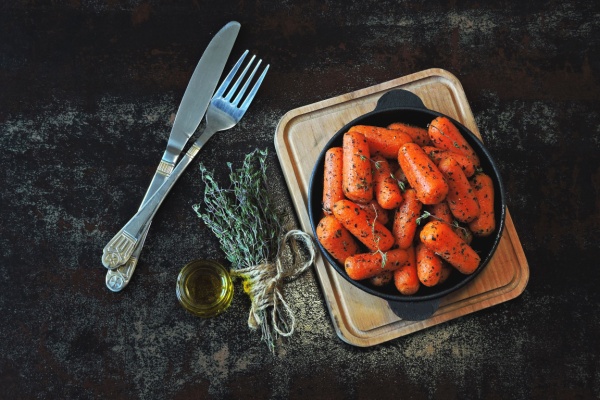If your go-to snack includes baby carrots, congratulations: you’re doing great things for your health. New research presented at the Nutrition 2024 conference found that a snack of baby carrots just three times a week increased skin carotenoids in young adults.
As Yahoo Life reports, carotenoids are the pigments found in fruits and vegetables that give them their bright red, orange, purple and yellow color. They’re important because they’re linked to better vision, which is often associated with carrots, as well as increased immune function, says Neda Akhavan, a University of Nevada assistant professor and dietitian. They also offer skin protection against UV damage.
It’s not easy to increase carotenoids in the body. Typically, it would take eating three times the recommended servings of fruits and vegetables (so, about 4.5-6 cup equivalents of fruits and 6-8 cup equivalents of vegetables) every day for three weeks in order to see these levels significantly increase. Yet, according to this study, snacking on carrots (about eight to 12, depending on size) just three times a week can do most of the heavy lifting.
And there’s a way to sneak in some bonus carotenoids too. The biggest increase the study saw came from a combination of the carrots and a multivitamin that contains beta carotene, the red-orange pigment found in carrots. While taking the multivitamin alone did not increase skin carotenoid levels, combining it with carrot snacking did. More research is needed to understand why, the study’s authors said.
More Healthy Reasons to eat like a Rabbit
Carotenoids are not the only reason to eat carrots, dietitian Courtney Pelitera tells Yahoo Life, noting that there are about 2 grams of fiber (a macronutrient many Americans are lacking, according to research) per medium-sized carrot. They are also a “great low-calorie snack,” she says, clocking in at about 25 calories for that same size of vegetable.
Carrots don’t have to be eaten plain and raw to reap the benefits. Dip them in a dressing or pair them with a tzatziki, hummus or even a mashed avocado. Also, try incorporating them into meals. Some ideas are…
- A spiced carrot smoothie [Woman’s Day]
- Grated carrots in a veggie burger [PureWow]
- Roast rainbow carrots and top them with sage brown butter [Eating Well]
- Pickle carrots — it’s not as hard as it seems — and add them to sandwiches and salads [All Recipes]
Can you eat too many carrots?
You may have heard rumors that eating too many carrots can turn your skin orange — and there’s some truth to that, dietitian Shelley Balls tells Yahoo Life. It all has to do with those protective carotenoids: When you eat too many carrots, you can develop a condition called carotenemia, which can cause your skin to turn an orange or yellow hue. This happens because carrots are high in beta-carotene, which can build up in your skin — and is particularly noticeable in areas like the palms of your hands, soles of your feet and under your nose, Balls explains.
“Carotenemia can occur by eating about 10 carrots a day for a couple of weeks,” Balls says. “If you do eat a lot of foods high in beta-carotene and you notice that your skin color is changing, it would be beneficial to include a variety of other vegetables in your diet in place of those foods for a few months to revert back to your healthy skin pigment.”
While carotenemia is usually harmless, it can be mistaken for jaundice — and most people don’t have a desire to look perpetually orange. However, this doesn’t mean you have to stop eating beta-carotene-rich foods such as carrots, sweet potatoes and squash. “Just do so in moderation if you start to see your skin pigment change,” she says.
Obviously, you should not eat carrots if you are allergic to carrots — but people allergic to birch, mugwort, ivy or celery also need to be careful about snacking on carrots. That’s because these plants share similar proteins, which can trigger allergic reactions.
So, too, do people with diabetes: While carrots are a healthy snack overall, they are higher in sugar than some other vegetables, which can affect blood sugar levels if consumed in large quantities.
—
Photo Credit: Sunvic / Shutterstock.com
